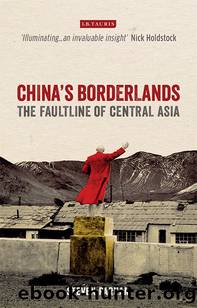China's Borderlands: The Faultline of Central Asia by Steven Parham

Author:Steven Parham [Parham, Steven]
Language: eng
Format: epub
Tags: Political Science, Asia, History, Geopolitics, China
ISBN: 9781784535063
Google: ogvfjgEACAAJ
Goodreads: 33509510
Publisher: I.B. Tauris
Published: 2017-03-30T00:00:00+00:00
PART II
WHOSE BORDERS, WHOSE BORDERLANDS?
After 1933 all our peoples started drawing apart because by then the Soviet Union had created borders between different homelands now in different countries [â¦] and divided everybody forever. Before this there had been centuries-long unity. Since then there has been disunity and more local nationalism and mutual dislike, but also more peace than before.
Zhylbek is in his seventies, the elderly son of an influential Kyrgyz manap (local leader) who had fled the collectivisation of land and livestock in Soviet Central Asia in the late 1920s. We are sitting in a teahouse that has been set up along the perimeter of an improvised race track for horses. Uighur boys serve customers with bowls of tea while the Kyrgyz and Kazakh clientele discuss the performance of the horses they have come here to purchase or to present for sale. Late afternoon at the Sunday market in Kashgar is Zhylbek's favourite time for exchanging news or discussing politics and family matters with his peers from Xinjiang's scattered Kyrgyz settlements. The desert sun will soon disappear behind the skyline of the Chinese New City; elderly men and women begin to outnumber the frantic crowds of Chinese businesspeople, Pakistani traders, Russian tourists, Saudi pilgrims and Australian backpackers. Zhylbek has been coming to Kashgar nearly every week for more than two decades. His visits always revolve around the business of livestock, but his chief interest lies in meeting Kyrgyz of a younger generation and hearing about how they live their lives in twenty-first-century China, comparing such tales to his own generation's heritage.
Zhylbek's life in China has been saturated with émigrés' stories of the lands left behind as well as their descendants' dreams of a better future. Unsurprisingly in today's Xinjiang, the theme of Kyrgyz unity is on his mind. The âdisunityâ that he mentions refers directly to his own biographical experiences with bordered lifeworlds. His father came to Xinjiang at a time when the people of the Tian Shan and Pamirs had become aware of the strength and permanence of the state in all its border-guarding might. Borderlanders such as he and his father have engaged with ruptures in Central Asia's political landscape by âusingâ the borderline. What he expresses as âlocal nationalism and mutual dislikeâ hints at a rift that has begun to appear in the borderlands formerly claimed by Kyrgyz and Pamiri as uniquely Kyrgyz and Pamiri lands allegedly âunifiedâ for centuries. Zhylbek acknowledges that socialist states expended considerable political and bureaucratic capital in disconnecting the formerly connected and creating new connections wedded to the state. With the collapse of socialism in Central Asia, this type of socialist-era connectivity has dwindled along with the ambition of the USSR's successor states in the region to promote new connections. Simultaneously, the still-socialist Chinese state in Xinjiang has found new strategies to connect to its periphery. Zhylbek reminds us that the state can never be taken out of local discourses and practices regarding the border.
Chapters 1 to 3 were mainly concerned with
Download
This site does not store any files on its server. We only index and link to content provided by other sites. Please contact the content providers to delete copyright contents if any and email us, we'll remove relevant links or contents immediately.
| Anthropology | Archaeology |
| Philosophy | Politics & Government |
| Social Sciences | Sociology |
| Women's Studies |
The Secret History by Donna Tartt(19092)
The Social Justice Warrior Handbook by Lisa De Pasquale(12191)
Thirteen Reasons Why by Jay Asher(8912)
This Is How You Lose Her by Junot Diaz(6889)
Weapons of Math Destruction by Cathy O'Neil(6281)
Zero to One by Peter Thiel(5802)
Beartown by Fredrik Backman(5756)
The Myth of the Strong Leader by Archie Brown(5509)
The Fire Next Time by James Baldwin(5448)
How Democracies Die by Steven Levitsky & Daniel Ziblatt(5219)
Promise Me, Dad by Joe Biden(5154)
Stone's Rules by Roger Stone(5088)
A Higher Loyalty: Truth, Lies, and Leadership by James Comey(4964)
100 Deadly Skills by Clint Emerson(4927)
Rise and Kill First by Ronen Bergman(4790)
Secrecy World by Jake Bernstein(4753)
The David Icke Guide to the Global Conspiracy (and how to end it) by David Icke(4720)
The Farm by Tom Rob Smith(4514)
The Doomsday Machine by Daniel Ellsberg(4490)
